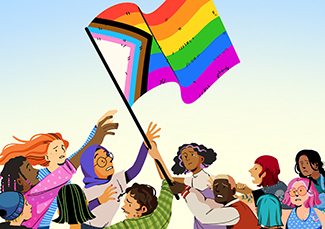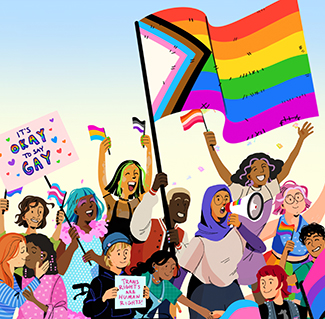
A political push across dozens of states to enact policies targeted at transgender and gender-expansive youth and the broader LGBTQIA+ community has created an urgent human rights challenge for social workers.
Texas Gov. Greg Abbott’s campaign to criminalize gender-affirming medical care for transgender youth may rank among the nation’s most strident efforts but represents only one among hundreds of recent proposals taking aim at LGBTQIA+ rights — and trans youth in particular.
Legislators nationwide have been considering — and in some cases adopting — similar measures targeting gender-affirming care and restricting access to fundamental public spaces (like bathrooms), as well as bills to limit trans students’ participation in sports. A contentious new Florida law that bars classroom lessons on, and even reference to, sexual orientation and gender identity also has spurred comparable legislation elsewhere.
While this legislative wave faces significant opposition and may ultimately fail, either in state legislatures or the courts, social workers and advocates warn it is taking a toll on the health and well-being of LGBTQIA+ kids who are already at higher risk for depression and other negative outcomes arising from systemic stigma, bullying and discrimination.
“Even if these bills don’t pass, just the fact that they exist is sending a message to these kids and families that they’re not safe, that they’re not valued and believed,” said Ellen Kahn, senior director of programs and planning at the Human Rights Campaign and a social worker by training. She said research consistently finds LGBTQIA+ youth have higher rates of depression, anxiety, homelessness, school absences and dropping out.
“I’d like to think that every social worker and every human services professional knows that the reason the data shows this is not that queer or trans kids are wired to have these outcomes but because we treat them (poorly),” said Kahn. “We know what stigma does to one’s mental health,” she added, noting that LGBTQIA+ youth may internalize rejection from family or peers, as well as harmful rhetoric from the increasingly hostile social environment.
“We could improve the mental health and well-being and optimism and opportunities for LGBTQ(IA+) people just by changing our behavior and being activated,” said Kahn, who suggested social workers living in states with anti-LGBTQIA+ bills consider how they can influence the outcome.
Targeting Vulnerable Youth
Lawmakers across the country have introduced hundreds of anti-LGBTQIA+ bills, including dozens focused on transgender youth, according to the HRC’s legislative tracker. Legislation is proliferating so quickly that it can be a task to keep up. “We saw an unprecedented number last year in 2021,” with “anti-trans sports bills and anti-trans care bans popping up all over the place,” said Kahn, noting that the trend is continuing this year.
In April 2022, Alabama’s legislature passed, and the governor signed, a measure to prohibit gender-affirming medical care for youth, with medical providers potentially facing 10 years in prison for violating the law. The American Academy of Pediatrics had opposed the measure, Reuters reported.
Alabama’s move followed similar efforts in Texas, where officials have stirred considerable anxiety for trans youth and their families. In February, state Attorney Gen. Ken Paxton issued a nonbinding opinion declaring that providing gender-affirming care for minors — prescribing puberty-blocking medication or performing gender-affirming surgical procedures — amounts to child abuse under Texas family law.
Among other points, Paxton contended that parents’ right to consent to a child’s medical care doesn’t extend to elective procedures and treatments that infringe on a child’s “constitutional right to procreate.”
Gov. Abbott then directed the Texas Department of Family and Protective Services to enforce Paxton’s opinion by conducting “a prompt and thorough investigation” of any reports of children receiving gender-affirming care.
The letter notes that the law imposes a duty on the child protective agency “to investigate the parents of a child who is subjected to these abusive gender-transitioning procedures, and on other state agencies to investigate licensed facilities where such procedures may occur.”
Courts so far have granted and upheld a temporary injunction stopping those investigations; Paxton has filed an appeal against the injunction with the Texas Supreme Court. The attorney general also launched an investigation into whether pharmaceutical companies deceptively promoted puberty-blocking medications for unapproved purposes without disclosing potential risks.

Paxton and Abbott’s moves follow legislative defeat in 2021 for a bill that similarly would have defined gender-affirming medical care as child abuse. Neither Paxton’s opinion nor Abbott’s letter are legally binding, according to Equality Texas, which indicated that Paxton’s opinion grossly mischaracterized evidence-based and medically necessary health care for transgender and gender-expansive children.
NASW Opposes Anti-LGBTQIA+ Bills
The National Association of Social Workers has joined the broad collection of organizations, including civil rights activists, medical associations, major corporations and LGBTQIA+ advocates, condemning legislation that targets trans youth and the LGBTQIA+ community at large.
NASW took particular exception to Abbott’s attempt to treat gender-affirming care as child abuse, noting that the effort directly opposes social work values, principles and the profession’s Code of Ethics, and poses imminent danger to transgender youth and their families.
“Although these cruel, politically motivated actions are nonbinding, they perpetuate transphobia, and further harm the mental health and well-being of transgender and gender-expansive youth by attempting to eliminate life-saving access to essential health services. These actions are taking place at a pivotal time: Rates of suicide and compromised mental health for transgender youth are at an all-time high due to the persistent threats posed by transphobic laws and institutional policies,” NASW stated in a news release.
NBC News reported in April that some Texas families with transgender children were deciding to leave the state at least temporarily because of Abbott’s directive; one mother made the decision after a children’s hospital where her transgender teen son received services temporarily suspended gender-affirming care for minors.
And the Texas Tribune reported that more than a half dozen state child welfare workers had resigned or were looking to leave rather than follow Abbott’s order to investigate families that support their children with gender-affirming medical care. (At the same time, those employees expressed concern about the effects of resignations on child abuse investigations in Texas.)
The order was hardly the state’s first move to target transgender students. As of Jan. 18, under a new state law, transgender student athletes in primary and secondary schools in Texas must compete according to the sex listed on their unamended birth certificates — a measure that imposes additional harm to the mental health of affected trans youth.
“We’re hearing from people that they don’t feel welcome in the state anymore. Some people are looking to move to other states that are more friendly to transgender issues and transgender rights,” said Alison Mohr Boleware, LMSW, who until recently served as government relations director for the NASW Texas chapter.
People are afraid to speak out, she said. “They don’t want to be reported for having a transgender child. It’s sending a message that our state is not welcoming to transgender youth and their families.”
Social workers should know that NASW has historically been involved in the fight, working alongside LGBTQIA+ groups in Texas to publicly oppose the legislation that would have outlawed gender-affirming childcare as abuse, she said.
Boleware also noted other attempts in the state’s last legislative session to limit medical care for trans people, not just youth. “It’s important to know that this isn’t the first effort to limit their access to gender-affirming care,” she said.

In Florida, meanwhile, Gov. Ron DeSantis recently signed into law a high-profile measure, which opponents disparage as the “don’t say gay” bill, that bars teachers from giving lessons about sexual orientation or gender identity in kindergarten through third grade “or in a manner that is not age-appropriate or developmentally appropriate” for students.
Florida officials have entered a political battle with the Walt Disney Co., which operates the state’s most popular tourist attraction, over the company’s opposition to the bill.
Laws like the “don’t say gay” bill are popping up elsewhere in the U.S. and gaining traction because of the broader “parents’ rights” talking points about what children are learning in school—an appeal to socially conservative parents—that proved successful in Virginia’s governor’s race, according to Kahn. “They claim that they know what’s best for their children, but when we say we do what we believe is best for our children, that’s not OK,” she said.
A Threat to Well-Being
Lee Westgate, MSW, LCSW-C, manager of policy and advocacy at NASW, didn’t mince words about the ramifications of state-led efforts like those in Texas and Florida. “We really want to frame these as violations of human rights of LGBTQIA+ youth,” he said in an interview.
The sports bans, which aim to keep trans girls from playing sports against other girls, effectively eliminate kids’ “access to peer support, to avenues that allow for camaraderie and social connection,” Westgate said. “It really promotes social alienation and isolation.”
The Texas attorney general’s opinion is “especially concerning because those are attempts to really co-opt those social welfare systems that are helpfully designed to support our most vulnerable neighbors,” Westgate said. Separating trans children and youth from supportive systems will cause panic and anxiety, he said.
The legislation and orders will affect young people beyond the states where they’re being proposed, Westgate said. “Even if a kid may not be living in that particular state, they’re bearing witness to what's happening in the much larger discourse.”
“There are really specific and targeted efforts, especially around trans kids. That is especially complex because there’s not effectively entrenched legal protections for trans folks in general,” Westgate said. “Trans identities are just not well-understood by the general public and that creates a lot of vulnerabilities for these specific populations.”
Although the Texas policy remains in the courts, with no final word at this point, Westgate said, “it’s created so much chaos for folks and so much anxiety and I think that’s the most tangible and immediate outcome of what’s happening. It’s made folks feel profoundly more unsafe.”
Kahn noted that the American Academy of Pediatrics and the American Medical Association support gender-affirming treatment. “These parents are getting the right kind of help for their kids,” she said.
Beyond Texas and Florida
While Texas and Florida may grab more headlines, other states have been busy adopting similar measures. Ten states had adopted anti-trans sports restrictions as of last November, the American Psychological Association reported, and efforts have expanded since then.
Iowa’s governor, for example, signed a bill in March requiring student athletes to participate in school and college sports based on the biological sex listed on their birth certificates—effectively banning transgender girls and women from competing in alignment with their gender identity.
LGBTQIA+ and civil rights advocates uplift and advocate that all young people should be able to enjoy the benefits of participating in team athletics and barring trans youth from competition can cause physical and emotional harm.
These targeted efforts have had a direct bearing on social work practices, according to Westgate, who noted that social workers place particular emphasis on working with marginalized and historically vulnerable populations.
The Trevor Project’s 2021 National Survey (See the resources section at the end of this article for where to find updated information for 2022.) on LGBTQ Youth Mental Health, which collected responses from nearly 35,000 participants ages 13 to 24, highlights that vulnerability. Among the findings:
- More than 40% of LGBTQ youth, and more than half of transgender and nonbinary youth, reported that they’d seriously considered suicide in the past year.
- 94% said recent politics had negatively affected their mental health.
- More than 80% reported that the COVID-19 pandemic had made their living situations more stressful, with 70% describing their mental health as poor during the pandemic.
- Nearly half wanted mental health counseling but had been unable to find it.
- Transgender and nonbinary youth whose pronouns were respected by those they live with and who could change their names and genders on legal documents reported lower rates of attempted suicide, as did LGBTQ youth with access to spaces where their sexual orientation and gender identity were affirmed.
LGBTQIA+ youth, already experiencing significant discrimination, now face legislation “seeking to discredit their existence” or to outlaw access to care, Westgate noted. “That has a tremendous influence on their mental and physical well-being.”
The acceleration and the sheer volume are astounding, he said. “This is playing out in the public arena. The presence of social media, the presence of rapid exchange of information, it really magnifies the psychological toll of these efforts across the country.” Westgate sees a clear connection between the widespread legislative efforts and the “staggering statistics” on the mental health of transgender youth.
Anti-LGBTQIA+ efforts are eroding hope, an important protective factor that enables people to get through most difficulties, Westgate said. “It’s affecting kids’ ability to feel hopeful.”
Social workers can support trans youth in a variety of ways. They can stand with groups fighting for transgender rights, like Lambda Legal, and “make sure they are voting for candidates that support LGBTQIA+ rights and aren’t afraid to stand against this,” said the NASW Texas Chapter’s Boleware.
Those doing clinical work can educate themselves on the issues and learn what they can do to create an inclusive and affirming office environment, she added, noting that NASW has prerecorded training sessions available. Social workers can look up continuing education units on LGBTQIA+ topics and see what’s available in their area, Boleware suggested.
“I think as a profession we can definitely take and continue to take additional steps to become trained on the life-saving value of delivering affirming care,” Westgate said, explaining that historically, trans issues were treated as a specialty topic requiring specialized training.
It’s important to equip trans kids with support and help them develop resiliency and hope “that yes, they can grow up and can have a place in this world,” Westgate said. “There’s a huge opportunity to bridge the divide between social justice and clinical care,” he said, including modernizing practice methods and advocating by engaging with trans and gender-expansive leaders. “Making those connections is very important when we’re talking about enhancing delivery of care.”
Why should social workers advocate for LGBTQIA+ rights? “It saves lives, it reduces the likelihood of harm, and it promotes healing—and I think those are three essential things that are intrinsic to social work practice and advocacy,” Westgate said.

The nation’s more than 700,000 social workers come from a variety of political and religious backgrounds and work in varied settings, including schools, child welfare programs, community agencies, private practice and health care facilities.
“There is tremendous diversity in the social work profession,” said the HRC’s Kahn. Despite a code of ethics, she said, “some social workers are not particularly affirming of LGBTQ(IA+) people, some still carry a lot of bias and may not recognize it.”
Social Workers’ Sphere of Influence
As adults and professionals, said Kahn, social workers should “challenge ourselves” about unconscious biases, about messages learned from our families and communities of origin and religious faith. “How can I find a way to hold belief important to me but make sure it’s not interfering with my ability to meet folks where they are and support them in their journey?” she added.
LGBTQIA+ youths report high rates of bullying and say they often don’t get support when they report it, Kahn said. In behavioral health, foster care, social services and family counseling settings, they may find their identities invalidated or stigmatized, she said.
“The great thing about the social work profession is that we are in many of these institutions in daily life,” said Kahn. “We find ourselves in these institutions that haven’t really been intentional” as organizations focused on LGBTQIA+ support, training and policies. Social workers, especially those in states pursuing anti-LGBTQIA+ policies, could decide how they can help frightened LGBTQIA+ kids, she said.
They might decide, “‘Hey, we could do better. Maybe I could be that person who could lead that charge,’” said Kahn. She also suggested talking to neighbors, friends and elected officials, sharing expertise and working with local organizations fighting anti-LGBTQIA+ bills. Kahn cited the example of a children’s hospital social worker who works with trans kids and families and has very actively tried to educate others, becoming a go-to person for other social workers.
“We have a sphere of influence that goes beyond just the interaction with the client or family or youth that comes to us,” said Kahn, adding that social workers have influence in organizations, cities and states. “We just maybe need to exercise some different muscles in advocating in some outer circles of our practice.”
Resources